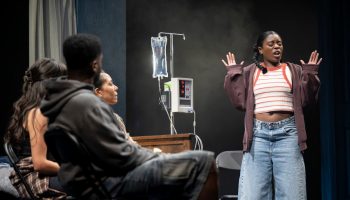
Gabriel Weber
Staff writer
In a night of discovery and joy, multiple Grammy-winning conductor JoAnn Falletta invites the audience to listen with hearts open and curiosity piqued.
The Chautauqua Symphony Orchestra performs at 8:15 p.m. tonight in the Amphitheater, joined by violinist Blake Pouliot, in an evening curated by Falletta.
Playing Erich Korngold’s Violin Concerto in D major, Op. 35 and Antonin Dvořák’s Symphony No. 6 in D major, B.112, Op. 60, the CSO presents a deeply romantic program with works that might be undiscovered gems for the audience.
Falletta and Pouliot have worked on many different pieces together; Pouliot has performed in concerts with the Buffalo Philharmonic Orchestra, of which Falletta is music director. After hearing Pouliot play Korngold’s Violin Concerto in D Major with the Montreal Symphony Orchestra on the radio, Falletta has always wanted to play the piece with him.
“He’s virtuosic, so everything is flawless, but there’s an emotional content — a sort of tenderness to this piece — when he plays it,” Falletta said. “There’s just a real feeling of understanding that I loved, so I hope the audience will feel that as well.”
Born in the Czech-Republic, Korngold was declared a genius early on by prominent composer Gustav Mahler. Even though Korngold was a published composer at 11, antisemitic prejudices were on the rise, and by 1933, the German government banned music by Jewish composers — including Korngold.
Korngold’s life was likely saved by Hollywood studios, Falleta said, as he was hired by Warner Studios in 1938 to score its film “Robin Hood.” When Korngold fled with his family to California, he was so devastated by the war that he promised not to compose concert works while Hitler was in power.
Korngold’s Violin Concerto in D Major was his very first composition after the war ended and was dedicated to Alma Mahler, the widow of Korngold’s mentor.
“I just love this piece,” Falletta said. “I mean, some people think it’s over-the-top romantic; I don’t see anything really wrong with that.”
Dvořák’s Symphony No. 6 in D Major grabbed the attention of the world in 1880, Falletta said. Unfortunately, Dvořák’s story is similar to Korngold in that the Vienna Philharmonic commissioned the work, but then wouldn’t play it because Dvořák was Czech. He ended up bringing the work to Prague to premiere.
“This was an affirmation of his love for his people — for Bohemia and Czechoslovakia. When people hear it, you can hear this landscape,” Falletta said. “I just thought this is the perfect thing to hear when you have the breeze around you in the outdoors, so I hope people will like that experience. It’s really about his homeland.”
That connection between Dvořák and his people is palpable, Falletta said. He was planning on growing up and being a butcher, as that was his father’s occupation, but the townspeople noticed that he had a great musical talent and gathered together to put enough money together to send him to Prague. As a sort of landscape painter, Falletta said, Dvořák expressed his warmheartedness through melodic material.
When working with different orchestras, Falletta finds it’s important to remain cognizant of the particularities in each symphony.
“You have some orchestras that have an amazing brass section, or some orchestras where the cellos love to sing — I, as the conductor, have to be aware of that and of who they are,” Falletta said. “They can’t tell me in words, but they can tell me in how they play, so I listen to a clarinet play a solo, and I feel like I know him musically so well, even though I don’t know his name. My ears are always open to catching what they are doing and ways that I can allow them the space to do that.”
What a great conductor offers, Falletta said, has more to do with intentionality in listening than an insertion of one’s self.
“The great conductor is the one who is interested in the only important thing — the musicians. It’s never about the conductor,” Falletta said. “If the conductor is focused completely on helping the musicians succeed and creating a place where excellence can bloom, that’s greatness.”
Falletta believes music uplifts humanity and fosters unity. She advocates for and mentors young professionals through seminars and the establishment of a collaboration between the Buffalo Philharmonic and the Mannes College of Music to give up-and-coming conductors professional experience.
“Music has never been as important as it is now because music brings us together,” Falletta said. “Music is a great force for having people learn about themselves and learn about the world. I noticed that the young musicians (are) all from all different backgrounds, but they come together — music does that. Music is a unifying force. It’s a force for understanding, for opening up your mind and knowing yourself.”
In getting to know herself through music and conducting, Falletta has found that flexibility is key. She aims toward “being open-minded and willing to change when someone plays something in a way that inspires you to do something different, and to always remember that (the musicians) are actually making that concert happen.”
“The conductor makes a lot of decisions, of course, and we’re leading them all the time,” she said, “but the concert belongs to them.”
Falletta finds that — even with being named one of the 50 great conductors of all time by Gramophone Magazine and receiving multiple Grammys — the road of discovery is continuously unwinding in front of her.
“In my music, I’m developing all the time because I work with musicians who are always teaching me,” Falletta said. “There’s just the idea that I can know more, I can learn from that person, or I can listen to something that will inspire me to change how I felt about it. That’s what is the great gift of art — that you never really know. To me, there’s something very beautiful about some sense of not knowing and learning all over time.”




